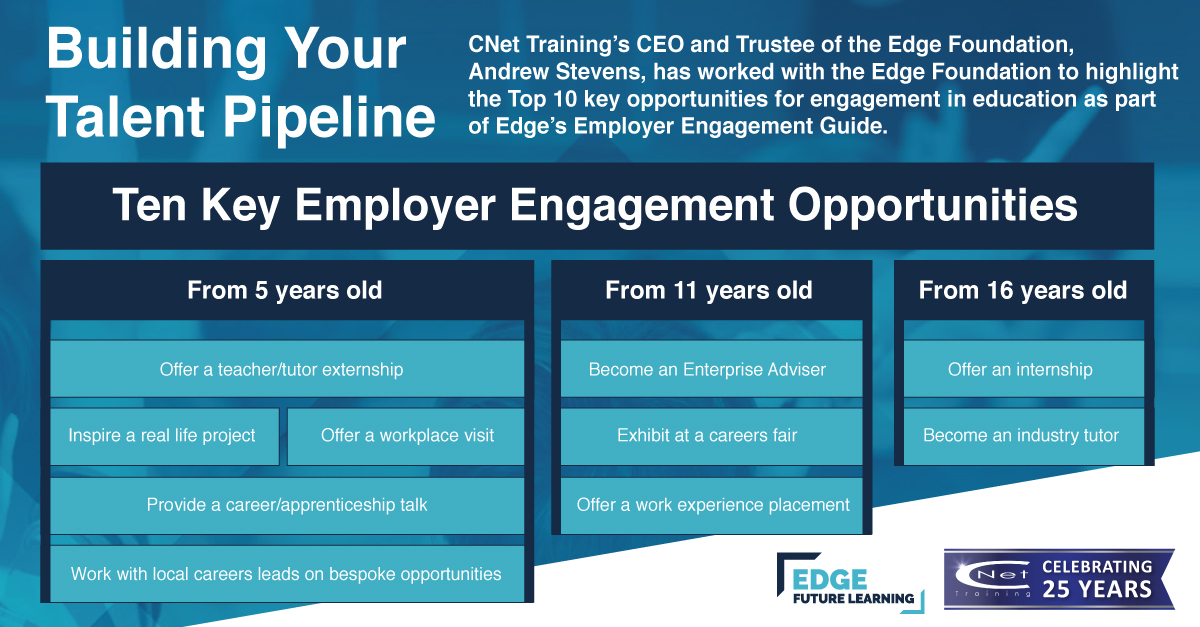
CNet Training’s CEO and Trustee of the Edge Foundation, Andrew Stevens, has worked with the Edge Foundation to highlight the Top 10 key opportunities for engagement in education as part of Edge’s Employer Engagement Guide.
Andrew Stevens, President & CEO – CNet Training and Trustee of the Edge Foundation, says, “Employers across all sectors are facing skills shortages. The temptation is to try and fill skills gaps quickly by attracting talent from neighbouring businesses or sectors. That seems to solve the short term problem, but it creates a merry-go-round of challenges and escalating costs across the labor market.
Instead, we need to find a way to work together to solve the bigger challenge of encouraging new people into the sector and future proofing the industry. The way to do that is for employers of all sizes to engage with education to build a pipeline of skilled young people who are ready to fill these gaps. Rather than re-inventing the wheel by creating a separate local or sectoral scheme, employers should get on board with the ten key ways to engage as set out in the guide.
Over the next five years, I want engagement in education to become the next sustainability for employers – working together towards a long term shared goal that drives collaboration and provides a very valuable economic and social return.”
Here are the Top 10 ways for employers to engage with learners from 5 years old through to 16+ and beyond…
From 5 years old
1. Offer a teacher/tutor externship
An externship is a chance for a teacher or tutor to visit for 1-2 days, observe how their subject is applicable in the workplace, then use that experience to inspire their students. By hosting an externship, you can support teachers and tutors to introduce a generation of students to your industry and organisation.
2. Inspire a real-life project
Schools, colleges and universities are increasingly open to working with employers to add real-life context. You could set students a project brief, offer support during the project and then feedback on their work at the end. You may be surprised by the new ideas they come up with.
3. Offer a workplace visit
You can broaden the workplace knowledge of young people and inspire them about different job sectors and roles by offering a workplace visit for a group of students, giving them an insight into your company, the different roles and the sector you work in.
4. Provide a career/apprenticeship talk
How did you get inspired to pursue your role? You could be that source of inspiration for young people by giving a careers or apprenticeships talk, opening their eyes to jobs and sectors they may not have known existed and showing the relevance of their education to real life.
5. Work with local careers leads on bespoke opportunities
As with any service, it can be more enjoyable and effective to go bespoke rather than off-the-shelf. Why not get in touch with your local education institution to see what would work best for both sides and create a package of engagement that helps to build your pipeline. In schools, you can ask to speak to the Careers Leader. In colleges, you may want to connect to the department most relevant to your sector. In universities, you can approach the careers service to connect.
From 11 years old
6. Become an Enterprise Adviser
As an Enterprise Advisor, you will work directly with a school or college’s Senior Leadership team at a strategic level – for around 8 hours per month. You can be involved in helping to shape the careers programme, using your strategic skills and business network to create opportunities with local employers and inspire students.
7. Exhibit at a careers fair
Careers fairs (both physical and virtual) give young people a chance to get to know a wide range of employers and industries in a short space of time. Think about how you can make yours stand out – why not bring along your newest or youngest employee, or consider a practical demonstration or activity young people could take part in?
8. Offer a work experience placement
Work experience placements are typically 1-2 weeks, or can be a day or two over several weeks. This can be arranged directly with your local education organization. To make the most of it, you can plan a short project for the student(s) to work on during the placement. Work experience is generally not paid and some companies have developed ‘virtual’ placements, where the student works remotely whilst getting a great insight into the organization.
From 16 years old
9. Offer an internship
Internships come in many shapes and sizes, but they should all involve giving young people a chance to work in your organization on real and engaging projects with support and mentoring from a member of the team. CIPD has produced guidance about what a good internship looks like. In some industries, employers can offer placements alongside new T-Level qualifications.
10. Become an industry tutor
If you or a member of your team want the pleasure of directly engaging with young people to share your skills and experience, work with your local FE college, training provider or university to become a part-time tutor or lecturer. This can be great CPD, and you can directly build the talent pipeline alongside your work.



